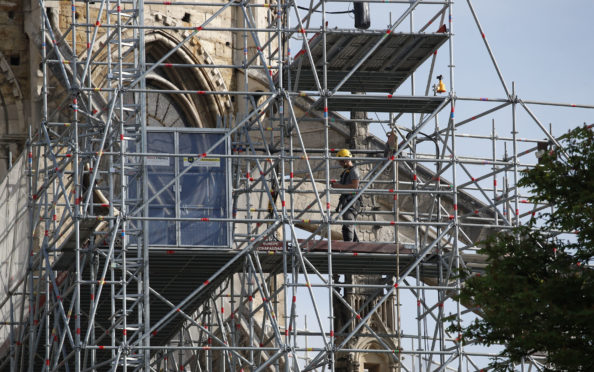“Hasten, O God, to save me; Come quickly, Lord, to help me. You are my help and my deliverer; Lord, do not delay.”
This was the opening psalm at morning mass in Notre-Dame Cathedral on 31 July, 2016.
I know because Mr R surprised me with a trip to Paris for our first wedding anniversary, and such were my powers of persuasion back then I managed to drag him along to a service.
A beautiful day. The majestic structure was glorious, the early sunshine filtering through the intricate stained glass windows onto our heads below as we listened to some of the purest singing I have ever heard.
It was a truly blissful moment and one I won’t forget.
Sadly, I can’t remember what the sermon was about. I didn’t understand all of it anyway.
I do still have the order of service however, which I dug out after the devastating fire that left France – indeed all of us – stunned.
I knew I would still have it.
Much to the annoyance of my husband and family before him, I’m a hoarder and hardly ever throw anything out, let alone keepsakes from such a milestone sojourn.
And right enough, there it was in my most recent memory box, alongside the Eurostar tickets and a business card from the restaurant where we enjoyed lunch later that day – La Maison Rose in Montmartre.
Looking at the text – printed in French, English, Spanish and Italian – it suddenly dawned on me how lucky we were to have been part of this iconic landmark’s 850-year history.
In the face of such destruction, it was also comforting to read those words – “Come quickly, Lord, to help me”.
And I’m grateful to have a small, personal memento of Our Lady.
For although, with time, she will surely become great once more, she will never be exactly the same again.
Thankfully, the damage is not as extensive as first feared, and the bulk of the main building, including its stone face and twin bell towers, was saved.
But while President Emmanuel Macron has pledged to rebuild the cathedral in five years to be ready for the 2024 Paris Olympics, experts have said the process could take much longer.
According to some estimates, the repairs might not be finished for two – or even four – decades.
If that timescale is borne out, the church, which has survived wars and the revolution, would be out of action for a generation.
That’s a big blow.
Of course we should remember at this juncture that no-one died in the blaze and for that reason I hesitate to call it a tragedy.
The Grenfell Tower fire, which claimed 72 lives, was a tragedy.
Yet I think the word does apply here, at least to some extent, given the age and significance of the edifice as well as its contents.
I heard one broadcaster put it very well: “A tragedy that killed no-one, just history”.
Because, while a little dramatic, Notre-Dame has absolutely been the site of many important events over the centuries, including the coronation of Napoleon Bonaparte as emperor in 1804 and a ceremony marking the liberation of Paris from Nazi occupation in 1944.
More recently, it became the focus for the outpouring of grief following the terror attacks on Paris in November 2015.
It was also obviously the inspiration for Victor Hugo’s novel, The Hunchback of Notre-Dame.
Much has certainly been lost.
And as someone who likes to preserve the past in memory boxes, watching the spire topple to the ground was deeply upsetting.
But, although we must reflect on what has happened and how, so as to protect against similar accidents in the future in other historic sites around the world, dwelling on it will achieve nothing.
I firmly believe this terrible happening should be seen as a new beginning, the start of the next chapter for this magnificent monument which will hopefully rise from the ashes to mark many more momentous episodes going forward.
What I didn’t tell you when recounting our anniversary celebrations is that attending a service at the local place of worship is a holiday custom of mine.
Obviously there is undoubtedly great worth in just going for a visit.
But for me, as well as marvelling at the architecture and the art, there’s something particularly special about experiencing the living, breathing community in action.
Because a church or temple or mosque is more than the bricks and mortar, it’s the believers themselves.
With that in mind, I was heartened in the aftermath of the fire to see the Holy Week rituals continue as usual and learn that officials have called for a temporary wooden cathedral to be built in the vicinity to house worshippers and visitors in the meantime.
This would mirror the approach taken in Christchurch where the so-called Cardboard Cathedral, designed by Japanese architect Shigeru Ban, was erected after the 2011 earthquake.
Yes, the physical church has been badly harmed.
As long as the congregation – and wider community – is determined to carry on, however, Notre-Dame could emerge from this disaster stronger than ever.
Parisians have shown remarkable resilience in the face of great pain in recent years.
I have every confidence, every faith, that their indomitable spirit – cruelly tested again – will see them through anew.
Lindsay Razaq is a journalist and former P&J Westminster political correspondent who now combines freelance writing with being a first-time mum

